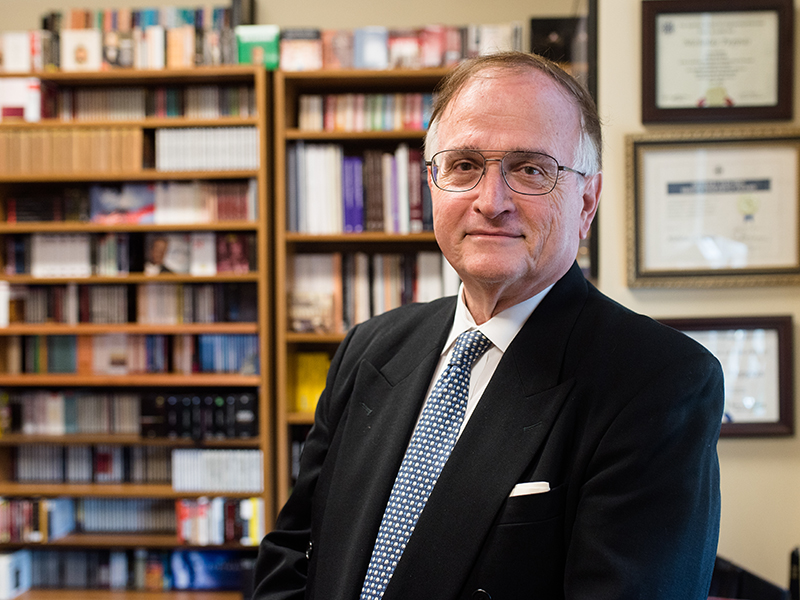Nicholas Peppas, professor of biomedical engineering, chemical engineering, pediatrics, surgery and pharmacy at The University of Texas at Austin and an expert in biomaterials and drug delivery systems, has been awarded the Sigma Xi Monie A. Ferst Award sponsored by the Georgia Institute of Technology Sigma Xi Chapter.
The chapter honored him for his contributions to research through his efforts to mentor and support several generations of graduate students. A symposium was held in his honor on Nov. 8, focusing on the achievements of his former graduate students and collaborators.

Peppas, who holds the Cockrell Family Regents Chair in Engineering #6 at UT Austin, was elected for his lifetime achievements in the areas of biomaterials, drug delivery and chemical engineering. He is recognized for his work on the preparation, characterization and evaluation of biopolymers and hydrogels, used as biomaterials in artificial organs and in devices for the delivery of drugs, peptides and proteins.
He has supervised the theses of 115 Ph.D. students and has been the research mentor of 990 postdocs, visiting scientists and graduate and undergraduate researchers who have worked in his laboratory and his UT Institute for Biomaterials, Drug Delivery and Regenerative Medicine.
“I believe that education is a continuous process that never stops,” Peppas said. “I teach my students, who affectionately call themselves ‘Peppamers,’ to study the fundamentals of their profession and to use their enthusiasm and creativity to achieve their goals and to improve the quality of life of our citizens and our patients through their successful contributions to science.”
Peppas has been an accomplished professor, researcher and entrepreneur throughout his distinguished career. He has eight honorary doctorates from Italy, Greece, Slovenia and Spain, 45 U.S. patents pending or issued, three companies founded and more than 1,650 papers published with 126,000 citations. He joined the UT Austin faculty in December 2002 and served as chair of the Department of Biomedical Engineering from 2009 to 2015.
Among his accolades, Peppas has received the Founders Award from the National Academy of Engineering and the Yarmolinsky Award from the National Academy of Medicine; the Acta Biomaterialia Gold Medal; the Giulio Natta Award from Italy, the Founders Award from the American Institute of Chemical Engineers, the Society for Biomaterials and the Controlled Release Society; and the Benjamin Garver Lamme Excellence in Engineering Education Award from the American Society for Engineering Education. He is the recipient of the Robert A. Pritzker Distinguished Lecture Award from the Biomedical Engineering Society and the Pierre Galetti Award from the American Institute of Medical and Biological Engineering. He was recognized by the American Institute for Chemical Engineers as one of the “100 Chemical Engineers of the Modern Era” and with a symposium honoring his “40 Years of Impact at the Frontiers of Science and Engineering.” He is Deputy Editor of Science Advances, and he is a member of the National Academy of Medicine, the National Academy of Engineering, American Academy of Arts and Sciences, the National Academy of Inventors, the National Royal Academy of Spain, the National Academy of France, the Academy of Athens (Greece), the Canadian Academy of Engineering, the Chinese Academy of Engineering and The Academy of Medicine, Engineering and Sciences of Texas (TAMEST).
Peppas was elected a member of Sigma Xi while at the Massachusetts Institute of Technology in 1973 and has been an active member at three universities. He was president of the Purdue University Chapter in 1996.
Most of his former students and collaborators continue interacting with him even 40 years later.
Jennifer Sinclair Curtis, dean of engineering at the University of California, Davis, and a former student of Peppas’ who started the symposium, has said, “There could be no greater supporter or mentor. When you work with Nicholas, you are ‘his’ for life. He keeps up with your career, your family, your life.”
